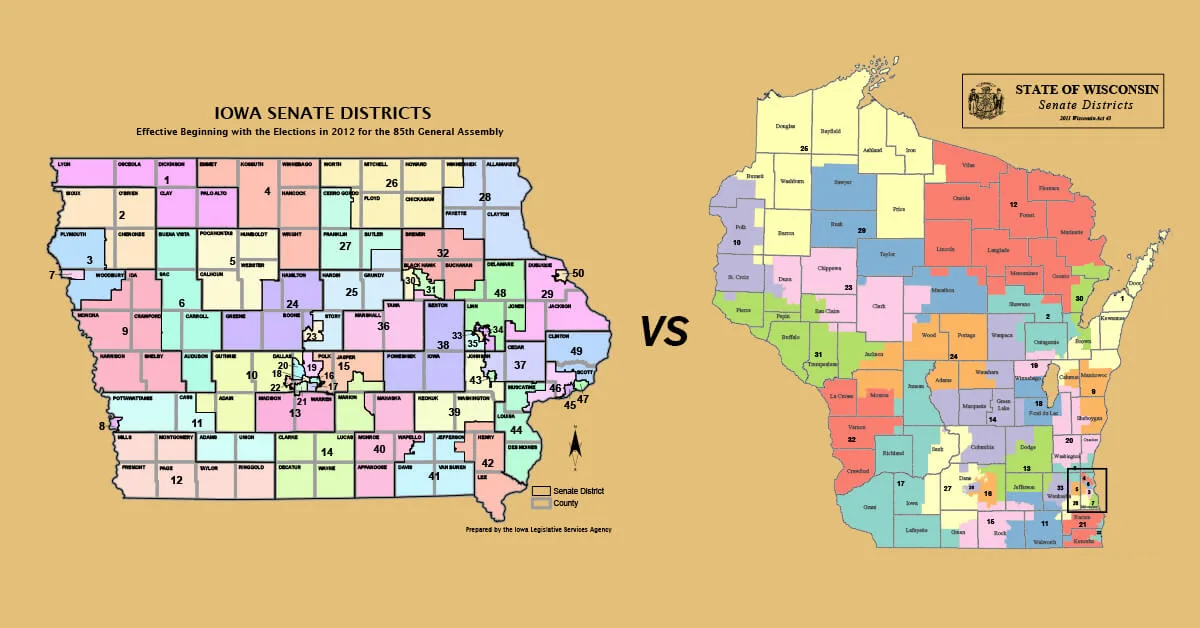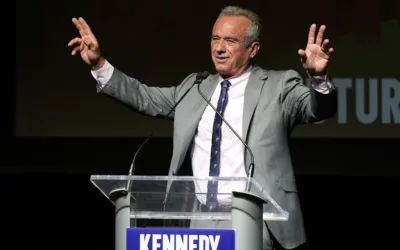
#image_title
“The People’s Maps Commission is so people can see and courts can see how rigged the system is.”
Wisconsinites overwhelmingly support efforts for election maps to be drawn through a nonpartisan process, a popular public opinion that stands in stark contrast to the past actions of the GOP-controlled Legislature.
This past Election Day, 11 counties and three municipalities across Wisconsin —from Bayfield to Door, Kenosha, Crawford, Dunn, and Waushara—had advisory referendums on their ballots, asking if voters wanted the Legislature to adopt a nonpartisan redistricting process.
All of the referendums passed by wide margins. The closest was in Rusk County where 57% voted in favor. The widest margin was in Bayfield County with 77% in favor. That matches up with the results of previous referendums and a Marquette Law School Poll from January that showed while voters were split on party lines on many other state issues, one area where they found common ground was wanting a nonpartisan commission to draw political districts.
“The idea of drawing these maps fairly and in an independent process is supported broadly by Republicans and Democrats,” said Sachin Chheda, director of the Fair Maps Project. “It’s important for the Legislature and the courts to take heed.”
Not that Chheda has much confidence that will happen.
Republicans in 2011 redrew the election maps without Democrats being able to oppose those changes through the legislative process. Republicans leaders and private advisors drew their maps behind closed doors, in some cases requiring lawmakers to sign nondisclosure agreements in order to see maps of their districts before the public.
Since then the state’s political districts have been stacked toward Republicans. Tuesday’s results were a reflection of that divide: while the state flipped for President-elect Joe Biden, the top of the ticket victory did not trickle down to Democrats at the statewide level. In the Statehouse, Democrats only gained two Assembly seats and lost two seats in the state Senate.

“It’s a real mismatch and that’s very intentional,” said Chheda. “And it’s an effort to subvert democracy.”
Last year, Assembly Bill 303 and Senate Bill 288 were pieces of legislation that mirrored Iowa’s redistricting laws. Iowa’s redistricting process is considered the “gold standard” for fair redistricting. The bills went nowhere.
Some Republicans crossed the aisle in support of those bills, such as Rep. Todd Novak of Dodgeville, Travis Tranel of Cuba City, Joel Kitchens of Sturgeon Bay, Loren Oldenberg of Viroqua, and Jerry Mursau of Crivitz.
Despite said support from his own party, Assembly Speaker Robin Vos (R-Rochester) dismissed Gov. Tony Evers’ People’s Maps Commission as politically charged and has said Republicans will draw their own map.
“[Vos] is protected from public sentiment because of gerrymandering so he ignores public sentiment about gerrymandering,” Chheda said. “He’s inoculated from public sentiment.”
The Fair Maps Project has partnered with other organizations across the state, including the Wisconsin Democracy Campaign. Executive Director Matt Rothschild that these political strategies can only work for so long.
“There’s a general discussion among Wisconsinites and among Americans that politicians shouldn’t be able to feather their own nest. They shouldn’t be able to tilt the level playing field one way or another,” Rothschild said. “At some point Robin Vos or his successor is going to have to smell the coffee on this one.”
Chheda said the People’s Map Commission component is key because it will provide a map to compare to what Republican attempt to pass.
“When they drew an unfair map 10 years ago, they didn’t have anything to compare it to,” Chheda said. “The People’s Map Commission is so people can see and courts can see how rigged the system is.”
The commission also is aligned with Law Forward, a progressive counterpart to Wisconsin Institute for Law and Liberty, founded by Doug Poland and Jeff Mandell. Poland was involved in the two-year-long legal battles over the 2011 maps that successfully changed the boundaries of two Milwaukee-area districts. They’re preparing for a legal battle over the new maps, which has already started.
Two of the newest Democratic members of the state Assembly, the only candidates who successfully flipped any districts, said they plan to lean into the issue of fair maps once sworn in. They said gerrymandering was a top issue among voters in their suburban Milwaukee districts.
Representative-elect Deb Andraca (D-Whitefish Bay), a gun-safety activist and substitute teacher, said she started her campaign against Rep. Jim Ott (R-Mequon) in part because he refused to support gun-safety measures, such as universal background checks on gun purchases, a practice supported by a vast majority of Wisconsinites.
“If you have something where 80% of constituents want something to change, the only way you can ignore that and keep getting elected over and over again is if you’re gerrymandered and you have a locked-in advantage,” Andraca said.
To the southwest, incoming Rep. Sara Rodriguez (D-Brookfield) also campaigned on undoing gerrymandering in her successful bid to unseat Rep. Rob Hutton (R-Brookfield) in the 13th Assembly District. The district includes part of western Milwaukee County and eastern Waukesha County.
“What the people of Wisconsin have overwhelmingly asked for is fair maps and fair representation in Wisconsin, and that’s what I want, too,” Rodriguez said. “I think that if we draw our maps fairly, where people are equally represented, we will move past this logjam of partisan politics and really be able to work for everybody in Wisconsin.”
Chheda said this time, they won’t be caught off-guard and are prepared to fight at the grassroots level, at the political level, and in the courts so they won’t see a repeat of 2011.
“All those factors are going to be very important as we work our way through the fight,” said Chheda. “It was an incredibly corrupt, incredibly secretive process, and it’s really important that we not allow that to happen again.”

This billionaire’s PAC is spreading a big lie about Tammy Baldwin, Medicare, and taxpayer savings
Restoration PAC, funded by Uline’s Richard Uihlein, twists the significance of forcing Big Pharma to negotiate for lower bulk pricing on Medicare...

New Biden rules deliver automatic cash refunds for canceled flights, ban surprise fees
In the aftermath of a canceled or delayed flight, there’s nothing less appealing than spending hours on the phone waiting to speak with an airline...

Opinion: It’s time for Congress to fight for small businesses instead of big corporations
May is National Small Business Month. Our elected leaders need to show leadership all year long. For the past 27 years I’ve been fortunate to pursue...

Biden makes 4 million more workers eligible for overtime pay
The Biden administration announced a new rule Tuesday to expand overtime pay for around 4 million lower-paid salaried employees nationwide. The...




